A California commission has again shot down a proposal to increase Starlink satellite launches from a local base — but it appears SpaceX and the US military don’t care.
On Thursday, the California Coastal Commission unanimously rejected a US Space Force request to boost the number of Falcon 9 launches from 36 to 100 per year at Vandenberg Space Force Base. The decision arrives nearly a year after the commission denied an earlier proposal to increase the launches from 36 to 50 by partly citing SpaceX CEO Elon Musk’s controversial politics and business practices. In response, Musk sued over alleged political discrimination.
At Thursday’s hearing, neither SpaceX nor US Space Force representatives showed up, likely because the military sidestepped the commission by classifying the Falcon 9 launches as a federal activity. The launches at Vandenberg base have involved both Starlink and Starshield, a military-grade version of the satellite internet service.
(Credit: California Coastal Commission)
The Department of the Air Force has since cleared SpaceX to increase the number of Falcon 9 launches to 50, citing “no significant impact” on the local environment. In addition, the US military has kicked off its own process to increase the number of Falcon 9 launches at Vandenberg to 100 per year. Although the Air Force is soliciting public input for a final decision this fall, the process also sidelines the California Coastal Commission.
The Air Force is merely consulting the commission, along with several other federal agencies. As a result, a California commission staff member conceded during Thursday’s hearing: “Effectively, the result of this vote does not prevent SpaceX from continuing launch activities.”
This time, the commission voted to reject the proposal, solely for a lack of information from the US Space Force, rather than mentioning Musk’s conduct. This includes “significant unresolved questions” about the noise and sonic booms from the increased launches and scarce details about the possible impact on surrounding marine and coastal wildlife.

Get Our Best Stories!
Your Daily Dose of Our Top Tech News

By clicking Sign Me Up, you confirm you are 16+ and agree to our Terms of Use and Privacy Policy.
Thanks for signing up!
Your subscription has been confirmed. Keep an eye on your inbox!
“There are a number of unanswered questions that make it really quite impossible for us to engage,” said Vice Chair Commissioner Caryl Hart. “And here today, once again, we see no appearance by the US Air Force, US Space Force, or SpaceX to answer the questions that we have — further indications that there just doesn’t seem to be willingness to provide further information.”
The commission’s report has also questioned the US Space Force classifying Falcon 9 launches as federal activity, saying a “small fraction” of the total flights have been meant to serve Department of Defense contracts.
During the hearing, local Californians also chimed in, saying they fear the impacts on noise levels and to local wildlife. “So, how does it feel to be ignored by your federal government and gazillionaires? Not good,” one resident said. “We want to protect. We’re protectors. This can’t be said for SpaceX. I’m sorry. They’re exploiters.”
Recommended by Our Editors
Meanwhile, Commissioner Christopher Lopez said he appreciated how Starlink can supply broadband during disasters or outages. This was evident when a tractor accidentally cut a fiber connection in his community, causing everyone to lose internet and wireless access, except for “those people who were early adopters of Starlink services.”
“For me, I hope as we move forward, there’s a continued willingness and openness to foster and rebuild a relationship that once existed,” he said, despite voting to reject the launch increase.
SpaceX and the US Space Force didn’t immediately respond to a request for comment.


5 Things to Know About Starlink Satellite Internet
About Michael Kan
Senior Reporter










